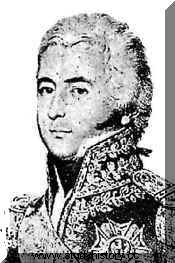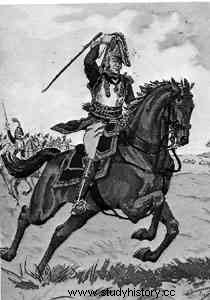May 30, 1768 (Bordeaux) - February 12, 1815 (Paris)
-

- Nansouty, Etienne-Marie-Antoine Champion, Count of
Étienne Marie Antoine Champion de Nansouty (Count of), French general, born May 30, 1768 in Bordeaux, died February 12, 1815 in Paris.
He was admitted to the Military School of Paris on October 21, 1782.
Cadet-gentilhomme with the rank of second lieutenant on May 30, 1783, he became a second lieutenant in the [Burgundy regiment] on March 26, 1785, replacement captain in the regiment of Franche-Comté-Cavalerie on April 6, 1788, and, on the 24th May, to the regiment of Hussars-Lauzun, which became the 6th regiment.
Appointed Lieutenant-Colonel of the 9th Cavalry Regiment on April 4, 1792, he served in the campaigns of 1792, 1793, and from Year II to Year VII in the armies on the Rhine.
Nansouty was soon noticed by his leaders by his bravery, his happy dispositions and his talents. He knew how to make himself useful in each of the ranks he obtained, and preserved in his regiment the discipline which it was so difficult to maintain then.
Appointed brigade commander on 19 Frimaire Year II, he justified the opinion that General-in-Chief Jean Victor Marie Moreau had formed of his prudence and his value; but, as modest as he was brave, he repeatedly refused the rank of brigadier general, which he only accepted on 12 Fructidor, Year VII.
Employed in the Army of the Reserve on 15 Ventôse Year VIII, he soon joined the Army of the Rhine.
Called to a larger theatre, General Nansouty rendered more effective services and contributed powerfully to the successes of the Army of the Rhine. He assisted General-in-Chief Ney in the various attacks he made, from Seltz to Mainz.
Nansouty surprised, at Sundhoffen, a company of Uhlans, which he brought back as prisoners of war without having lost a single man.
On the 12th Floréal, at Stockack, he commanded a brigade of heavy cavalry, and his skilful maneuvers paved the way for the success of this affair.
On the 13th, at Engen, he commanded Lecourbe's reserve, and this general declared that he owed part of the success of this battle to the wise measures and intrepidity of Nansouty. On the 15th, at Moeskirch, he often broke the enemy by brilliant and repeated charges at the head of his cavalry. When General Lecourbe received the order to march to seize one of the bridges over the Danube, from Dillingen to Donauworth, Nansouty ensured the rear of the French army against the Prince of Reuss, whose corps was stationed in the Tyrol, and beat him every time he wanted to come out. On the day of the 24th Prairial, the general having been attacked by the Prince of Reuss, he repulsed him vigorously as far as Fuessen.
This general took the most glorious part in all the affairs which ended the last campaign of this war, and acquired the reputation of one of our good generals of cavalry. At the head of his regiment, he charged with the valor of a soldier; commander of a brigade, he directed it with the prudence, precision and eye which, in critical moments, decides victory.
On 12 Prairial Year IX, employed by the Gironde Observation Corps, and made available to the government on 12 Nivôse Year X, Nansouty was attached to the 22nd Military Division on the following 28 Ventôse.
Promoted general of division on 3 germinal year XI, he commanded, on the 5th, the department of Seine-et-Oise, and, on 8 floréal, he was part of the camp of Nijmegen.
Appointed member of the Legion of Honor on 19 Frimaire Year XII, he joined the army of the coasts of the Ocean, and received the cross of Commander of the Order on the following 25 Prairial.
General Nansouty then took command of the 1st heavy cavalry division of the Grand Army, and made the campaigns of the years XIV, 1806 and 1807, in Austria, Prussia and Poland.
At the head of a corps of cuirassiers, he decided the success of the battle of Wertingen, distinguished himself at Ulm, and contributed powerfully to the victory of the battle of Austerlitz. Nansouty performed prodigies of valor at Eylau and at Friedland. Marshal Lannes having ordered him to go in front of the French army, he passed with his division of cavalry under a terrible fire, and restrained until six o'clock in the evening the efforts of a mass of enemies. The Russians, deceived by his skilful maneuvers, did not dare to advance, and Napoleon I had time to arrive with his army.
Grand officer of the Legion-d'Honneur on 4 Nivôse, year XIV, Nansouty received, as a reward for his fine conduct in this campaign, the grand eagle of the Legion-d'Honneur on July 11, 1807, and the title of first squire of the Emperor the following year. In this capacity, he accompanied Napoleon, first to Spain.
He made the campaign of Portugal with Charles Victor Emmanuel Leclerc. He took part in the conquest of Hanover under Mortier.
He accompanied Napoleon to Erfurt, received the most honorable welcome from the sovereigns, and was created count of the Empire on March 19, 1808.
In 1809, General Nansouty took command of the reserve division of heavy cavalry in the grand army in Germany, and put the height of his reputation by executing, at Essling and Wagram, these fine charges which completed to secure the victory under French flags. The Emperor granted him an endowment of 10,000 francs on the domain of Zeven, located in Hanover. Nansouty resumed, close to Napoleon, his functions of first equerry, employed part of 1811 in making general inspections of cavalry, and passed, on December 25, to the observation corps of the Elbe.
In April 1812, he commanded the 1st Cavalry Reserve Corps of the Grand Army in Russia, found himself at the Battle of the Moskowa, where he rendered the greatest service and was shot in the knee.
Appointed colonel general of the dragoons on January 16, 1813, he redoubled his courage as the dangers became more eminent; Nansouty gloriously attended the affairs of Dresden, Wachau, Leipzig and Hanau, where he again shed his blood for the fatherland. On July 29, he took command of the Imperial Guard and merited an honorable mention in the bulletins of the Grand Army in Saxony.
In the Campaign of France, he performed prodigies of valor at Champ-Aubert, at Montmirail on February 11, 1814, at Craonne, and was wounded in these last two cases.
He joined the Bourbons in 1814.
The following April 20, a member of the Commission of General Officers for the Guard, he joined the 18th Military Division on the 22nd as Extraordinary Commissioner of the King.
Created Knight of Saint-Louis on June 1, Inspector General of Dragoons on July 14, he then became Captain-Lieutenant of the 1st Company of Musketeers.
General Nansouty died in Paris, as a result of his wounds and the fatigues of war, on February 12, 1815.
His name is inscribed on the Arc de Triomphe on the east side.
-

- Nansouty, Etienne-Marie-Antoine Champion, Count of
